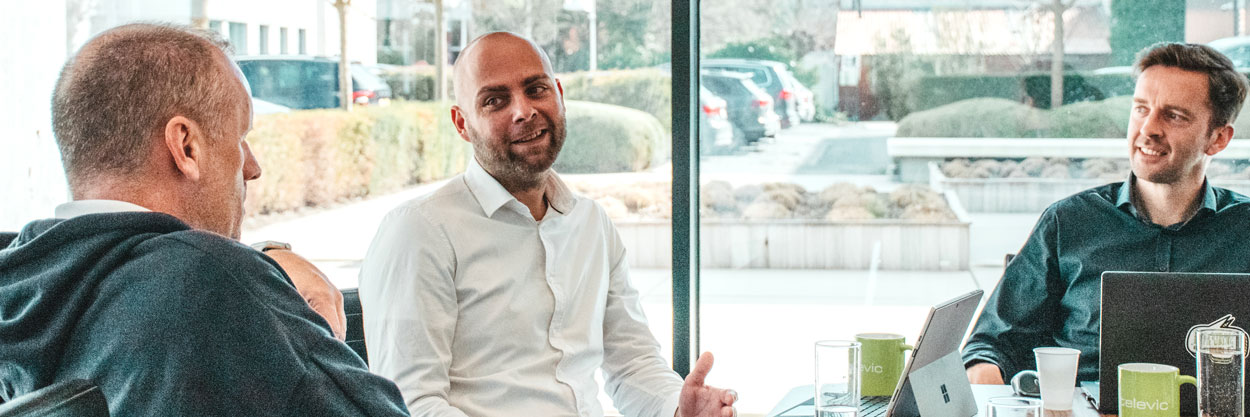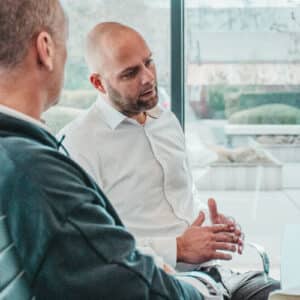
Can digital exams be used for any subject?
The possibilities of digital exams continue to increase. Will we eventually use digital exams for everything? For example, how do you digitize oral exams? And is it even necessary? We asked e-assessment experts Tom Huiskamp (IBEX), Filip Vanlerberghe (Televic Education) and Bert Wylin (Televic Education). Bert: “The subject of the exam has never yet been a deal-breaker. The main issue is resistance to change. But this resistance soon evaporates when the benefits become clear.”
Certification: waiting period reduced from two weeks to one hour
Tom, you have worked at IBEX since 2010. Were they already using digital exams when you started?
Tom: “No, we ran our first digital exams in 2011. We started nice and simple, with digital multiple-choice exams for the theory part. But nowadays, almost all our exams are done digitally. All told, we have about 25,000 candidates per year. 10% of them are still doing paper exams, but we are experimenting with digitizing these as well.”
 “These days, a candidate takes a digital exam and an hour later – if the result is positive – they are emailed their certificate. It used to take two weeks.”
“These days, a candidate takes a digital exam and an hour later – if the result is positive – they are emailed their certificate. It used to take two weeks.”
Tom Huiskamp, Exams Unit Manager at IBEX
What are the biggest benefits for you?
Tom: “Marking is largely automatic and therefore much faster. An hour after the end of your exam, your certificate can land in your inbox. Before digitization, it took two weeks. Digital exams are also a lot more reliable: for example, it is far less likely that candidates can copy each other’s answers, because you can change the order of the questions for each candidate. And with open questions, the marking is much more traceable: you can check which marker gave which score and why.”
What subjects are digital exams most commonly used for?
Filip: “Language exams have always been a forerunner. That’s where we’ve made the biggest inroads. And they are also ideal for assessing simultaneous interpreters, where you have to listen to the source and the interpreter at the same time. Digitally, this is much easier with a platform like assessmentQ. We also have specific exercise types for it.”
 “Simultaneous interpreting is difficult to assess, as you have to listen to the source and the interpreter at the same time. Digitally, this is much easier with a platform like assessmentQ.”
“Simultaneous interpreting is difficult to assess, as you have to listen to the source and the interpreter at the same time. Digitally, this is much easier with a platform like assessmentQ.”
Filip Vanlerberghe, Product Manager, Televic Education
“Sometimes we are also surprised. In secondary schools, geography teachers have become avid users in a short time. This probably has to do with the question format ‘indicate country x or river y on this blind map’. It has found acceptance very quickly.”
Curious about which subjects you can use assessmentQ for? Contact us for a short conversation with one of our experts..
About IBEX
IBEX is a Dutch company specialising in independent professional exams, from developing questions to organising exams and improving them. It is part of the Kiwa group, which is active in testing, inspection and certification (TIC). Kiwa employs more than 10,000 people in around 40 countries worldwide.
IBEX and Televic: a solution-focused collaboration
Since 2023, Televic Education and IBEX have been working together with one goal: helping customers to conduct better digital examinations. Tom Huiskamp: “We listen to each other. In assessmentQ, the user experience is fantastic, but Televic Education also thinks of the end user. Test developers can choose from a wide range of question forms. Content experts without a technical background can also work very easily with assessmentQ. And there are useful features that you find nowhere else, such as an AI system that suggests wrong answers to multiple-choice questions.”
Practical objections
Are there any reasons not to digitize exams?
Tom: “Even in 2024, there are still people who aren’t very good at using computers. Fortunately, Televic is putting a lot of effort into making assessmentQ more and more user-friendly.”
Filip: “The most important thing with people who are less digitally literate is to offer them fewer options. With open questions, for example, we have a toolbar to format the text. All those buttons sometimes confuse people. One solution is to make the interface as clean as possible; otherwise you end up testing digital skills instead of knowledge.”
 Do digital exams work better with closed questions?
Do digital exams work better with closed questions?
Tom: “Open-ended questions are certainly possible. I personally prefer closed questions, because you can mark them completely automatically. This is faster and therefore cheaper for customers. But if you do need to ask an open question, it’s useful to have that possibility on the same platform.”
“For example, until a few years ago, candidates had to draw diagrams on paper. This was a pain, because you had to collect those papers afterwards, sort them, assess them separately and input the results into the program. Nowadays candidates can use a tablet to draw diagrams on a digital canvas in assessmentQ. A human still has to evaluate that diagram, but all the intermediate steps have been removed.”
“assessmentQ now has more than 30 different types of questions. You can use it to ask questions on an enormous range of subjects, but it also makes taking exams more fun. If you have to tick boxes for 90 minutes, you will become less sharp.”
Are digital exams really suitable for every subject?
Bert: “The subject of the exam has never yet been a deal-breaker. The main issue is resistance to change. But this resistance soon evaporates when the benefits become clear.”
Even for oral exams?
Can you digitize orals as well?
Bert: “When I started designing digital exams in 2001, I thought doing oral exams digitally would never work. But today we’re doing them more and more. There is a lot of demand for them because of their traceability: especially with expensive certificates and high-stakes exams, the chance of disputes increases. If you can replay an oral exam afterwards, that puts examiners in a good position.”
 “When I started designing digital exams in 2001, I thought oral exams would never work. But today we’re doing them more and more. Because you can replay a full exam, they’re very popular.”
“When I started designing digital exams in 2001, I thought oral exams would never work. But today we’re doing them more and more. Because you can replay a full exam, they’re very popular.”
Bert Wylin, e-assessment expert Televic Education
Tom: “Historically, there are two main reasons for not organizing an exam digitally. The first is accessibility. In fact, though, Televic has completely solved this problem. Besides excellent reading software, assessmentQ is also compatible with equipment such as Braille displays. And for people with low literacy, you can integrate photos and videos.”
“The second reason is skills testing. In this regard, too, digital exams can deliver added value. For example, we organize asbestos exams. In the past, candidates were given a physical sample and had to determine whether it was asbestos or not. Getting those samples to the exam venue was a logistical burden. Now they examine the sample digitally: they can zoom in on the image with the mouse and view the sample from all sides.”
The future is hybrid
Are we heading towards a future with only digital exams?
 Bert: “Practical assignments remain difficult to digitize entirely. But digitization can certainly help. Imagine an exam in which a candidate is presented with all sorts of ingredients on a table and has to prepare a meal for a baby with a gluten allergy. Currently this is still done in the traditional way, in front of a jury of several people. But if you can get a good video recording of the exam, you don’t have to bring in a multi-person jury. One jury member on site is enough. If there are any disputes, you have proof of what happened. A jury member will still have to taste the food afterwards, however. The computer can’t do that!”
Bert: “Practical assignments remain difficult to digitize entirely. But digitization can certainly help. Imagine an exam in which a candidate is presented with all sorts of ingredients on a table and has to prepare a meal for a baby with a gluten allergy. Currently this is still done in the traditional way, in front of a jury of several people. But if you can get a good video recording of the exam, you don’t have to bring in a multi-person jury. One jury member on site is enough. If there are any disputes, you have proof of what happened. A jury member will still have to taste the food afterwards, however. The computer can’t do that!”
Tom: “In practical assessments, you need to see what candidates are actually doing, and sometimes you have to do that on location. Take connecting electricity cabins, for instance. During the corona crisis, we tried to test that using Microsoft Teams, but it was not clear enough. What we do do is score candidates on location using a tablet instead of paper. This saves us valuable time.”
Bert: “We don’t want to replace everything, and we don’t need to. What we do do is support people digitally. That digital support guarantees a fair, consistent assessment for everyone.”

Let’s talk
Schedule a 15-minute call, and discuss your challenges with our experts.

Tom Huiskamp
Tom has been with IBEX since 2010. As Exams Unit Manager, he has experienced the shift to digital exams up close. Today, IBEX creates and organizes digital tests for a wide range of subjects.

Filip Vanlerberghe
Filip is passionate about web-based software. As a Product Manager at Televic Education, he applies his two decades of experience in software, usability, e-learning, marketing and strategy.

Bert Wylin
Bert is an EdTech pioneer. His academic background and entrepreneurship are at the basis of what assessmentQ is today. Bert keeps his finger on the pulse of the market. He understands real customer needs and translates them into workable innovations. Bert is also a content expert, specialising in creating accurate, rich and reliable content for e-assessments.

